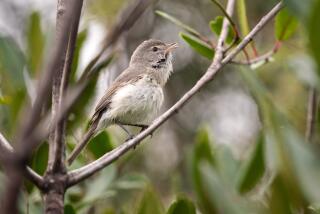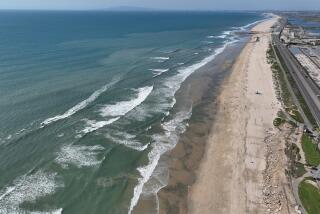An Oil-Soaked Bird Is a Sorrowful Sight
- Share via
Up the road, tourists, high school kids and the locals crowd around outraged environmentalists demanding accountability and change.
The environmentalists rail against offshore oil drilling and greed. They point to the oil-slick sea beyond the Huntington Beach pier. Television cameras bear down. Microphones and sound booms reverberate with angry noise.
Here inside a cluttered lifeguard storage garage about a mile away, it is quieter, but the smell of oil is so heavy you can taste it.
Millicent Wood of the International Bird Rescue Research Center pulls a western grebe, its feathers dull with crude, from a cardboard box.
The red of its eyes, terrified, cut like unblinking lasers. Its cry is sharp and loud, bone chilling in its pain. The bird urinates and tries to fight back, but Wood’s hand has clamped firmly around its long, thin beak.
About 300,000 gallons of oil spilled into the ocean off Huntington Beach from the hull of the American Trader, carrying British Petroleum crude oil. It was an accident.
Here in the storage garage, though, one can see what carelessness really means. So far, 25 oil-drenched birds, alive and suffering, have arrived. Eight others were dead from the spill.
These numbers, of course, will surely change. The estimates are that they will get worse.
Soon, I am sure, people will begin to put this in perspective. They will say that the animal death toll at Huntington Beach is, comparatively, not bad.
Nearly 500 sea otters were killed in Valdez waters, more than 2,800 birds. The oil that blanketed Alaska’s Prince William Sound congealed with the cold. In Surf City, evaporation from a warm sun may lessen the harm.
But when I see these birds, all of this becomes an abstraction, only marginally meaningful to the sorrow at hand. The oil has clogged the aquatic lifeline. Here is only the most visible proof.
When a bird is coated in oil, its feathers lose their ability to protect the creature from the cold. Its waterproofing protection is ruined.
Birds such as the grebe, which dive for their food, find themselves unable to fly away. Those that are able to swim try desperately to hold their heads above the water.
Here in Huntington Beach, human arrogance and bumbling has, once again, brought environmental tragedy close at hand.
Jon Fischer, an officer of the state Department of Fish and Game, reaches inside a cardboard box for another blackened grebe that a volunteer has found on the shore. The bird screams and tries to bite, which is a good sign. There is life worth saving.
The bird is weighed and its temperature taken rectally, as one would do with a small child. Its leg is tagged and then Millicent Wood fills a syringe with Pedialyte, an electrolyte-rich solution for sick children, and places the thin rubber tubing down the bird’s throat. It drinks.
In a minute, the bird will join the others in a long plywood box, like a crude coffin, which is cushioned with crushed newspaper and draped with a white sheet. Here the birds rest and regain some of their body heat.
The oil fumes will lessen with time. Perhaps some of the sea creatures will eat. People are to be kept away. In about 24 hours, after the birds have calmed down, they will be washed with a solution of water and Dawn detergent, the one that experience proves works best.
This, now, is the procedure, grimly calm and assured. Wednesday night, before British Petroleum agreed to pay the Berkeley-based bird rescue center to take charge, volunteers scrubbed off the first six birds right away.
Volunteers have been quick to offer their help in Huntington Beach. Mothers and fathers have come with their children. People have taken off work.
As I watch, one woman brings in a pigeon which she thinks has been damaged by the spill.
Jon Fischer looks at it, holding it in his hand, and determines that it is merely ill. Then he picks up a dead grebe, limp and slick, and shows the woman what she should look for. She nods, and leaves to find something else.
Then one of the volunteers says that she has gotten a call from Shell Oil, offering a place to house more sick birds. Everyone laughs at that one, and soon they start imagining the public relations benefits the company would reap.
“I can just see it,” says one Fish and Game officer. “ ‘We care’ the ads will say.”
Just before I leave the garage, I ask Jon Fischer how he keeps his anger in check.
“Sure I’m angry,” he says. “Aren’t you? It’s really upsetting to see this happen. . . . But maybe people will get upset enough to put some safety measures in place to protect our resources. If that happens, then it is possible that this, at least in some regard, could be a good thing.”
More to Read
Sign up for Essential California
The most important California stories and recommendations in your inbox every morning.
You may occasionally receive promotional content from the Los Angeles Times.










